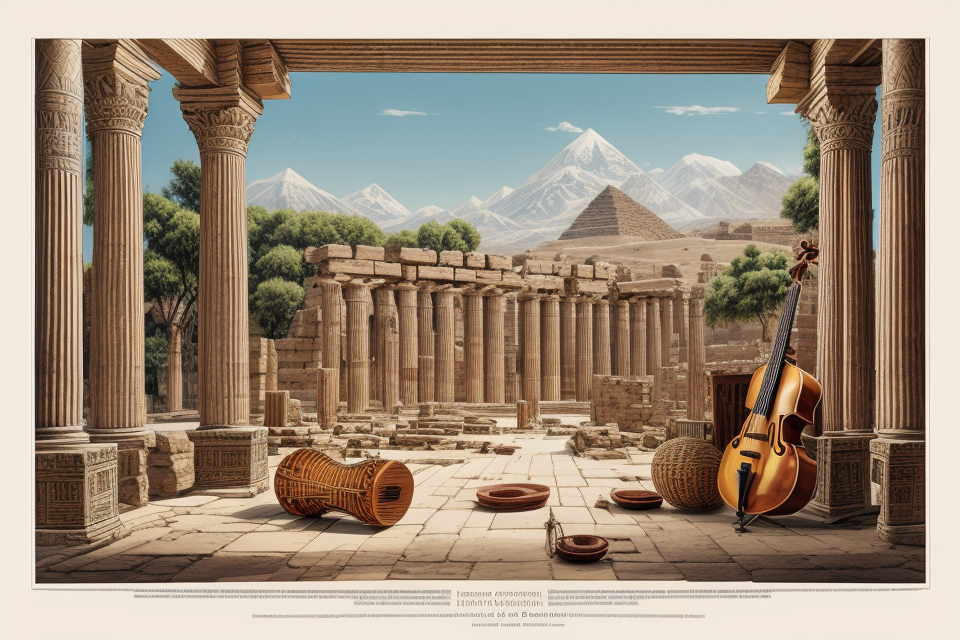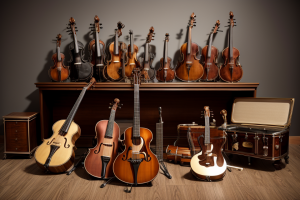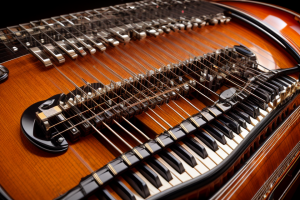
The invention of musical instruments has been a subject of fascination for many. The earliest evidence of musical instruments dates back to the Paleolithic era, where cave paintings depicting musical instruments such as flutes and harps have been found. However, the question remains, who first invented these instruments?
The history of musical instruments is a rich and complex one, with different cultures and civilizations contributing to its development over time. From the ancient civilizations of Egypt, Greece, and Rome to the medieval ages of Europe, the invention of musical instruments has been a testament to human creativity and ingenuity.
In this article, we will delve into the origins of musical instruments and explore the various theories surrounding their invention. We will also examine the impact that these instruments have had on society and culture throughout history. So, buckle up and join us on this journey to uncover the mystery behind the invention of musical instruments.
The Evolution of Musical Instruments
The Earliest Instruments
The earliest musical instruments can be traced back to prehistoric times, when humans first began creating tools to produce sound. These early instruments were often made from natural materials found in the environment, such as bones, shells, and wood. They were used for a variety of purposes, including communication, ritual, and entertainment.
The Flute
The flute is one of the oldest known musical instruments, with evidence of its use dating back to the Paleolithic era. These early flutes were made from bones, such as those from the leg bone of a large bird or mammal. They were typically about 20-30 centimeters long and had three or four finger holes. The sound produced by these flutes was high-pitched and nasal, and they were likely used in rituals and ceremonies.
The Lyre
The lyre is another ancient instrument that has been found in various cultures around the world. It is a stringed instrument that consists of a soundbox, two arms, and a crossbar. The strings are typically made from animal gut, and the soundbox is often made from wood. The lyre was used in ancient Greece and Rome, and was a popular instrument among the aristocracy. It was played by plucking the strings with the fingers or using a plectrum.
The Drum
The drum is one of the oldest and most widely used musical instruments in the world. It is a cylindrical instrument that is typically struck with the hand or a stick. Drums have been found in many ancient cultures, including those of Africa, Asia, and the Americas. They were often used in religious ceremonies and as a means of communication in war. The sound of the drum was also believed to have healing properties, and was used in many traditional medicines.
The Middle Ages
During the Middle Ages, music played a significant role in the daily lives of people. It was used in religious ceremonies, courtly entertainment, and folk traditions. Several musical instruments were invented during this period, which greatly influenced the development of music. In this section, we will discuss three notable instruments from the Middle Ages: the lute, the hurdy-gurdy, and the organ.
The Lute
The lute is a stringed instrument that originated in Europe during the 13th century. It is played by plucking or strumming the strings with the fingers or a pick. The lute had a body with a pear-shaped outline and a flat soundboard, and it was typically constructed with a neck, a fingerboard, and a bridge.
The lute was a popular instrument among the nobility and the bourgeoisie, and it was used in various forms of music, including secular and sacred music. It was often used as an accompaniment to the human voice and was featured in many medieval song cycles. The lute’s popularity declined in the 17th century, but it experienced a resurgence in the 20th century, and it is still played today by enthusiasts of early music.
The Hurdy-Gurdy
The hurdy-gurdy is a stringed instrument that is played by crank
The Renaissance
During the Renaissance, musical instruments underwent significant changes and improvements. The increased interest in classical music and the humanist movement played a significant role in the development of new instruments. Here are some of the most notable musical instruments that emerged during this period:
The Violin
The violin is one of the most iconic instruments of the Renaissance period. It is believed to have originated in Italy in the 15th century, and its design was heavily influenced by the lute. The violin quickly became popular in Europe, and its versatility and expressiveness made it the perfect instrument for composers to showcase their creativity. The violin family, which includes the viola, cello, and double bass, also emerged during this period.
The lute is another instrument that gained popularity during the Renaissance. It is a stringed instrument with a body shaped like a pear or a boat, and it has a distinctive neck with a pegbox. The lute was widely used in court and chamber music, and its melodic and harmonic qualities made it a favorite among composers. The lute was also used as a solo instrument, and its intricate fingerwork and complex chord progressions required a high level of skill and dexterity from the player.
The Harpsichord
The harpsichord is a keyboard instrument that was invented during the Renaissance. It has a distinctive design, with a keyboard that is parallel to the soundboard, and its strings are plucked by small plectra when the keys are pressed. The harpsichord was widely used in court and church music, and its bright and resonant sound made it a popular choice among composers. The harpsichord also had a significant influence on the development of the piano, which emerged later in the 18th century.
In conclusion, the Renaissance was a period of great innovation and creativity in the world of musical instruments. The violin, lute, and harpsichord are just a few examples of the many new instruments that emerged during this time, and their designs and features continue to influence the development of musical instruments to this day.
The Modern Era
The Piano
The piano is one of the most popular and versatile musical instruments in the world. It was invented in the early 18th century by Bartolomeo Cristofori, an Italian instrument maker. The piano’s design has evolved significantly over the years, with improvements in sound quality and mechanical components. Today, the piano remains a staple in classical music and is used in a wide range of genres, from jazz to rock.
The Guitar
The guitar is another instrument that has been around for centuries, with origins dating back to ancient civilizations such as Egypt and Greece. However, the modern guitar as we know it today was developed in Europe during the 16th century. It underwent significant changes in the 19th and 20th centuries, with the development of electric guitars and the incorporation of new technologies. Today, the guitar is a ubiquitous instrument in popular music, with countless musicians and genres incorporating it into their sound.
The Saxophone
The saxophone is a relatively modern instrument, invented in the mid-19th century by the Belgian instrument maker, Adolphe Sax. Sax was inspired by the clarinet and the French horn, and he sought to create an instrument that would bridge the gap between these two instruments. The saxophone quickly gained popularity in the late 19th and early 20th centuries, and it became a staple in jazz and other genres. Today, the saxophone remains an essential instrument in many styles of music, from smooth jazz to rock and roll.
The Invention of the Modern Instrument
The Piano
The First Piano
The piano is a musical instrument that was first invented in the early 18th century by Bartolomeo Cristofori, an Italian instrument maker. It was initially called the “pianoforte,” which translates to “soft-loud” in Italian. The piano was designed as an improvement to the harpsichord, which was the primary keyboard instrument of the time. The harpsichord had a limitation in that the volume of the sound it produced was fixed, and could not be changed. The piano, on the other hand, allowed for dynamic control, as the keys could be played either softly or loudly, depending on the amount of pressure applied.
The Evolution of the Piano
Over the years, the piano underwent several changes and improvements. In the early 19th century, the Viennese school of pianoforte makers, led by Steinway and Sons, developed the modern form of the piano. They added a cast iron plate to the frame of the instrument, which increased its stability and allowed for a more powerful sound. The piano’s soundboard was also enlarged, and the strings were made longer, resulting in a richer and more resonant sound.
In the mid-19th century, the French piano maker, Camille Pleyel, introduced the “steel frame” piano, which had a steel plate bolted to the frame instead of a cast iron plate. This new design allowed for greater tuning stability and improved resonance. The American piano manufacturer, Chickering & Sons, also introduced the “million-dollar piano” around this time, which had a larger soundboard and more powerful steel frame, resulting in a more powerful and resonant sound.
The Piano Today
Today, the piano remains one of the most popular and widely used musical instruments in the world. There are many different types of pianos, ranging from the upright piano to the grand piano, each with its own unique sound and characteristics. The modern piano is a highly refined instrument, with decades of technological advancements and improvements that have resulted in a powerful and versatile instrument capable of producing a wide range of sounds and dynamics. The piano remains an essential instrument in classical music, and is also widely used in popular music, jazz, and other genres.
The Guitar
The First Guitar
The earliest known guitar-like instrument was the ancient Egyptian instrument known as the “sekhet,” which was a long-necked lute that was played with a plectrum. However, the guitar as we know it today began to take shape in Europe during the Middle Ages.
The Evolution of the Guitar
During the Renaissance, the guitar underwent significant changes, with the development of the “Viol family” of instruments, which included the violin, viola, and cello. The guitar continued to evolve in the centuries that followed, with the addition of frets and the development of different types of guitars, such as the classical guitar and the acoustic guitar.
The Guitar Today
Today, the guitar is one of the most popular musical instruments in the world, with millions of people playing and listening to guitar music every day. From rock and roll to classical music, the guitar has become an integral part of many different genres and styles of music. It continues to be a popular choice for both amateur and professional musicians, and its versatility and accessibility make it a beloved instrument for players of all skill levels.
The Saxophone
The First Saxophone
The saxophone, an instrument that has become synonymous with jazz music, was invented by the Belgian instrument maker, Adolphe Sax, in the early 1840s. Sax was a talented musician and instrument maker who had already invented several other instruments, including the saxhorn and the saxtuba. He was inspired to create the saxophone after hearing a performance by a French military band that featured a clarinet and a bass horn.
The Evolution of the Saxophone
The first saxophone was patented by Sax in 1846 and was initially met with skepticism by other musicians. However, over time, the instrument gained popularity and was soon adopted by military bands and orchestras around the world. The saxophone was initially made in several different keys, including B-flat, E-flat, and C, but today, the most commonly used saxophones are the alto, tenor, and soprano saxophones.
The Saxophone Today
Today, the saxophone remains an essential instrument in many genres of music, including jazz, blues, and rock. It is prized for its distinctive sound and versatility, and many famous musicians, including Charlie Parker and John Coltrane, have made the saxophone a central part of their musical style. Despite advances in technology, the saxophone continues to be made largely by hand, with each instrument crafted by skilled artisans using traditional techniques.
The Impact of Instruments on Society
The Importance of Music
Music has been an integral part of human culture for thousands of years. It has the power to evoke emotions, bring people together, and transcend language barriers. Throughout history, music has played a significant role in various aspects of society, including religion, politics, and entertainment.
The Power of Music
Music has the ability to influence people’s moods, thoughts, and behaviors. It can uplift spirits, calm the mind, and provide comfort during difficult times. Music has also been used as a form of therapy to help individuals with mental health issues, such as anxiety and depression.
The Benefits of Music
Music has numerous benefits, including improving cognitive abilities, promoting creativity, and enhancing memory. Studies have shown that learning to play a musical instrument can improve brain function, including spatial reasoning and executive function. Music also helps to develop listening skills, enhance creativity, and improve overall academic performance.
In addition to the cognitive benefits, music has been shown to have a positive impact on physical health. It can reduce stress and anxiety, lower blood pressure, and improve cardiovascular health. Music has also been used in pain management, helping individuals to cope with chronic pain and discomfort.
Overall, the importance of music in society cannot be overstated. It has the power to bring people together, evoke emotions, and provide numerous benefits to individuals and communities alike.
The Evolution of Music
The evolution of music can be traced back to the early stages of human civilization. Music has been a vital part of human culture and has undergone significant changes over time.
The Development of Music
The development of music can be divided into several stages, including the ancient, medieval, renaissance, baroque, classical, and modern periods. Each period has its unique characteristics and contributions to the evolution of music.
During the ancient period, music was used in religious ceremonies and as a form of entertainment. The development of music in this period was heavily influenced by the use of drums, flutes, and other simple instruments.
In the medieval period, the development of music was marked by the rise of polyphonic music, which involved multiple independent melodic lines. This period also saw the emergence of the organ, which became a dominant instrument in church music.
The renaissance period saw a significant shift in the development of music, with the emergence of new instruments such as the violin and the harpsichord. This period also marked the rise of secular music, which was no longer restricted to religious ceremonies.
The Influence of Music
Music has had a profound influence on society throughout history. It has been used as a form of communication, entertainment, and expression. Music has also played a significant role in shaping cultural identity and has been a reflection of social and political changes.
The influence of music can be seen in various aspects of society, including education, politics, and technology. Music has been used as a tool for education, with music theory and history being taught in schools and universities. Music has also been used as a form of political expression, with songs being written to promote social and political causes.
Furthermore, technology has had a significant impact on the evolution of music, with the development of new instruments and recording techniques. The invention of the phonograph in the late 19th century revolutionized the music industry, making it possible to mass-produce and distribute recordings. The advent of digital technology has also had a profound impact on the music industry, with the rise of online music streaming and digital music distribution.
In conclusion, the evolution of music has been a complex and dynamic process, influenced by a variety of factors such as culture, technology, and politics. Music has played a significant role in shaping society throughout history and will continue to do so in the future.
The Future of Music
The future of music is a topic that has been debated by scholars, musicians, and music lovers for years. With the rapid advancement of technology, it is hard to predict what the future of music will hold. However, there are a few things that we can be sure of.
The Future of Instruments
One of the biggest questions regarding the future of music is what instruments will be used. Will we see new instruments being invented, or will existing ones become obsolete? It is possible that we will see a shift towards electronic instruments, as they offer a wider range of sounds and are easier to transport. However, acoustic instruments will always have a special place in music, and they will continue to be used in various genres.
The Future of Music Technology
Technology has already had a significant impact on the music industry, and this trend is likely to continue in the future. We can expect to see more advanced music technology being developed, such as AI-powered music creation tools and virtual reality music experiences. These technologies will open up new possibilities for musicians and music lovers alike, and will continue to shape the way we create and enjoy music.
In conclusion, the future of music is uncertain, but we can be sure that technology will play a significant role in shaping it. Whether we see new instruments being invented or existing ones becoming obsolete, one thing is for sure – music will continue to be an important part of our lives.
The Evolution of Musical Genres
Classical Music
Classical music is often considered the foundation of Western music, dating back to the Medieval period. The earliest forms of classical music were liturgical chants and Gregorian chants, which were performed in religious ceremonies. As time passed, composers such as Johann Sebastian Bach, Wolfgang Amadeus Mozart, and Ludwig van Beethoven emerged, each contributing to the development of classical music. The orchestral instrumentation of strings, woodwinds, brass, and percussion evolved during this period, leading to the creation of complex and intricate pieces that are still performed today.
Jazz
Jazz originated in the late 19th and early 20th centuries in the Southern United States. It is characterized by its improvisational nature and the use of brass and woodwind instruments. Jazz evolved through various subgenres, including Dixieland, swing, bebop, and jazz fusion. Notable jazz musicians include Louis Armstrong, Miles Davis, and John Coltrane. Jazz has had a significant impact on popular music and continues to influence contemporary genres such as hip-hop and R&B.
Rock
Rock music emerged in the 1950s and gained popularity in the 1960s with the rise of artists such as Elvis Presley, Chuck Berry, and Buddy Holly. Rock music is typically characterized by its use of electric guitar, bass guitar, and drums. Subgenres of rock include rock and roll, heavy metal, punk, and alternative rock. Rock music has had a significant impact on popular culture and has influenced fashion, language, and social attitudes.
Electronic Dance Music
Electronic dance music (EDM) emerged in the 1970s with the invention of the synthesizer. EDM is produced using electronic instruments and software, and it often features repetitive beats and melodies. Subgenres of EDM include techno, house, trance, and dubstep. Notable EDM artists include Daft Punk, The Chemical Brothers, and Deadmau5. EDM has had a significant impact on popular music and has influenced many contemporary genres, including hip-hop and pop.
The Future of Musical Genres
As musical instruments continue to evolve, so too does the future of musical genres. With advancements in technology and a growing global community of musicians, the possibilities for new and diverse styles of music are seemingly endless. Here are some factors that will shape the future of musical genres:
The Influence of Technology
Technology has already had a profound impact on the music industry, and this trend is only set to continue. From digital audio workstations (DAWs) that allow musicians to create and record their own music to virtual instruments that simulate the sounds of traditional instruments, technology is opening up new avenues for musical expression. Additionally, advancements in music technology are making it easier for musicians to collaborate with one another, regardless of their physical location. This will likely lead to an increase in the number of musical collaborations and fusions of different genres.
The Evolution of Sound
As technology continues to advance, so too does our ability to manipulate and manipulate sound. This will lead to an increase in the number of new and unique sounds being created, as well as a greater level of control over the sonic qualities of music. Additionally, the development of new audio processing techniques and effects will allow musicians to create music that sounds like nothing we’ve ever heard before.
The Evolution of Instruments
The evolution of musical instruments is also an important factor to consider when looking at the future of musical genres. As new instruments are developed, they will open up new possibilities for musicians to explore. Additionally, the evolution of existing instruments will lead to new and unique sounds being created. This will in turn lead to the development of new musical styles and genres, as musicians push the boundaries of what is possible with their instruments.
Overall, the future of musical genres is exciting and full of possibilities. As technology continues to advance and instruments continue to evolve, we can expect to see a wide range of new and diverse musical styles emerging. The possibilities are endless, and the future of music is sure to be an exciting journey.
The Future of Musical Performance
The future of musical performance is a topic of much debate and speculation, with many wondering how advancements in technology will shape the way we experience music. While it is difficult to predict exactly what the future will hold, there are several trends and developments that are likely to have a significant impact on the world of musical performance.
The Impact of Technology
One of the most significant factors that will shape the future of musical performance is technology. With the rise of digital music production and the increasing accessibility of high-quality recording equipment, it is likely that we will see more and more musicians turning to technology to create and perform their music. This could include everything from virtual reality experiences to advanced music software that allows for greater creative control and precision.
The Future of Live Music
Another key trend that is likely to shape the future of musical performance is the evolution of live music. As technology continues to advance, we can expect to see more and more innovative and immersive live music experiences. This could include everything from holographic performances to interactive concerts that allow audience members to participate in the music-making process.
The Future of Studio Recording
Finally, the future of studio recording is also likely to be shaped by technology. As digital audio workstations (DAWs) become more powerful and user-friendly, it is likely that more and more musicians will turn to them as their primary means of music production. This could lead to a shift away from traditional analog recording methods and towards a more digital-centric approach to music-making.
The Future of Music Education
The Importance of Music Education
Music education has been a cornerstone of human society for centuries, and its importance continues to grow in the modern era. With the increasing role of technology in everyday life, it is more important than ever to ensure that individuals have access to high-quality music education programs.
One of the primary reasons why music education is so important is that it provides a well-rounded education that goes beyond academic subjects. Through music education, students can develop their creativity, self-expression, and communication skills. Additionally, music education has been shown to have a positive impact on academic performance, with students who participate in music programs often performing better in other subjects.
The Future of Music Pedagogy
As technology continues to advance, the way in which music is taught and learned is evolving. With the rise of digital music technology, new teaching methods and tools are being developed to help students learn music in new and innovative ways. For example, online music education platforms and mobile apps are becoming increasingly popular, providing students with access to high-quality music education resources anytime, anywhere.
Moreover, advances in music technology are also making it easier for students to collaborate with one another and with professional musicians. For instance, digital audio workstations (DAWs) allow students to record, edit, and produce music from their own homes, opening up new opportunities for collaboration and creativity.
The Future of Music Technology in Education
As technology continues to play an increasingly important role in music education, it is essential that educators stay up-to-date with the latest trends and developments. This means investing in new technologies and tools, as well as providing ongoing training and professional development opportunities for educators.
Additionally, as music technology continues to evolve, it is important that educators focus on teaching students the skills they need to succeed in the digital age. This includes developing students’ skills in areas such as music production, composition, and arrangement, as well as providing them with the knowledge and understanding of music technology necessary to succeed in the music industry.
Overall, the future of music education is bright, with new technologies and teaching methods providing students with exciting new opportunities to learn and engage with music. By investing in music education and staying up-to-date with the latest trends and developments, educators can help ensure that students have the skills and knowledge they need to succeed in the ever-changing world of music.
The Importance of Music in Culture
The Role of Music in Society
Music has played a significant role in shaping society throughout history. From ancient civilizations to modern times, music has been used to celebrate victories, mourn losses, and bring people together. In many cultures, music is an integral part of social events such as weddings, festivals, and religious ceremonies. It serves as a form of entertainment, but also as a means of communication and expression.
The Role of Music in History
Music has been a reflection of the historical events and periods in which it was created. For example, during the Renaissance, music was used to celebrate the rebirth of art and culture. In the 18th century, classical music was used to express the ideals of the Enlightenment. In the 20th century, popular music was used to reflect the social and political changes of the time.
The Role of Music in Religion
Music has been an important aspect of religious ceremonies and rituals for thousands of years. In many religions, music is used to create a sacred atmosphere and to express devotion and gratitude. Music has been used in Christian churches to enhance the worship experience and to tell the story of the Bible. In Hinduism, music is used to accompany prayers and to express the teachings of the religion.
In summary, music has been an integral part of society throughout history, playing a significant role in shaping culture, reflecting historical events, and expressing religious beliefs. The impact of music on society cannot be overstated, and its importance will continue to be felt for generations to come.
The Importance of Music in the Digital Age
In the modern era, technology has played a significant role in transforming the way we experience and consume music. With the rise of digital platforms and online streaming services, music has become more accessible than ever before. In this section, we will explore the importance of music in the digital age and how it has impacted our society.
The Influence of Technology on Music
The integration of technology in the music industry has transformed the way music is produced, distributed, and consumed. Digital audio workstations (DAWs) have made it possible for musicians to record, edit, and produce high-quality recordings in their home studios. These advancements have enabled artists to have more creative control over their music and have opened up new opportunities for collaboration and distribution.
The Future of Music Distribution
The rise of digital platforms such as Spotify, Apple Music, and Tidal has revolutionized the way music is distributed. These platforms provide artists with a global audience and have democratized the music industry, making it easier for independent artists to reach a wider audience. The future of music distribution will likely involve even more technological advancements, such as artificial intelligence and blockchain technology, which will further change the way music is distributed and monetized.
The Future of Music Consumption
With the rise of digital platforms, music consumption has also changed dramatically. Streaming services have replaced physical albums and downloads as the primary way people listen to music. This shift has had a significant impact on the music industry, as artists are now compensated based on the number of streams rather than physical sales. The future of music consumption will likely involve even more personalized experiences, with AI-powered recommendations and virtual reality concerts becoming more prevalent.
Overall, the digital age has had a profound impact on the music industry, transforming the way music is produced, distributed, and consumed. As technology continues to advance, it will be interesting to see how these changes shape the future of music and its role in society.
The Future of Music as an Art Form
The future of music as an art form is an intriguing topic that raises several questions about the evolution of music and its role in society. With the advent of technology, the way we create, perform, and experience music has undergone significant changes. Here are some of the trends that are shaping the future of music as an art form:
The Evolution of Music
The evolution of music is a continuous process that has been influenced by various factors such as social, cultural, and technological changes. In the past, music was primarily created through acoustic instruments and the human voice. However, with the advancement of technology, electronic instruments and digital software have become more prevalent, enabling musicians to create new sounds and textures that were previously impossible. The evolution of music has also been influenced by globalization, which has led to the fusion of different musical styles and genres, creating a more diverse and inclusive musical landscape.
The Future of Music Creation
The future of music creation is likely to be shaped by the increasing use of technology. Digital audio workstations (DAWs) and virtual instruments have already become essential tools for many musicians, enabling them to create and record their music in high-quality studios anywhere in the world. Additionally, artificial intelligence (AI) and machine learning algorithms are being used to generate new sounds and music, opening up new possibilities for musical experimentation and innovation. As technology continues to advance, it is likely that the role of the human musician will evolve, with more emphasis on creativity and expression rather than technical proficiency.
The Future of Music Performance
The future of music performance is also likely to be influenced by technology. Live streaming platforms such as YouTube and Twitch have already transformed the way musicians perform and interact with their audiences, enabling them to reach a global audience without the need for physical concerts. Virtual reality (VR) and augmented reality (AR) technologies are also being explored as new ways of enhancing the music performance experience, allowing audiences to immerse themselves in virtual worlds and interact with musicians in new and exciting ways.
Overall, the future of music as an art form is likely to be shaped by the intersection of technology and creativity. As new tools and platforms continue to emerge, musicians will have new opportunities to express themselves and connect with audiences in ways that were previously impossible. However, it is important to remember that technology is simply a tool, and the human element of music remains central to its power and impact.
The Future of Music Technology
The Impact of Technology on Music
In recent years, technology has had a profound impact on the music industry. Digital audio workstations (DAWs) like Ableton Live and Logic Pro have made it possible for musicians to produce and record their own music in high-quality from their home studios. The rise of music streaming services like Spotify and Apple Music has also transformed the way that people listen to music, making it easier than ever to access a vast library of songs on demand.
The Future of Music Production
As technology continues to advance, it is likely that the music production process will become even more streamlined and accessible. We can expect to see more powerful and user-friendly DAWs, as well as new tools and techniques for creating and manipulating sound. Virtual and augmented reality technologies may also play a role in the future of music production, allowing musicians to create immersive and interactive experiences for their audiences.
Technology is also changing the way that music is taught and learned. Online courses and tutorials have made it possible for people around the world to access high-quality music education, regardless of their location or financial resources. Digital instruments and software have opened up new possibilities for music composition and performance, allowing students to explore new sounds and techniques that would have been impossible with traditional instruments. As technology continues to evolve, we can expect to see even more innovative approaches to music education, making it accessible and engaging for students of all ages and backgrounds.
The Importance of Music in the 21st Century
The Future of Music in Society
In the 21st century, music has become an integral part of society, playing a crucial role in various aspects of human life. Music has evolved over time, and its impact on society has been profound. In this section, we will explore the future of music in society and how it will continue to shape our lives.
The Future of Music in Culture
Music has always been a reflection of culture, and it continues to play a significant role in shaping cultural identity. As technology advances, music is becoming more accessible, and new genres are emerging. The future of music in culture is exciting, and it will be interesting to see how it continues to evolve and influence society.
The Future of Music in Education
Music education has been an essential part of the school curriculum for many years. It has been proven to have a positive impact on cognitive development, academic performance, and overall well-being. The future of music in education looks promising, and it will be interesting to see how technology continues to shape the way music is taught and learned.
Overall, the importance of music in the 21st century cannot be overstated. It has the power to bring people together, transcend boundaries, and create a sense of unity. As technology continues to advance, the future of music is bright, and it will be exciting to see how it continues to shape our lives and society as a whole.
The Importance of Music in the World
The Role of Music in Human Evolution
Music has been an integral part of human history since the beginning of time. It has played a crucial role in human evolution, serving as a form of communication, expression, and even a tool for survival. Early humans used music to convey important messages, to warn of danger, and to express emotions that were difficult to articulate through language alone. Music was also used to facilitate group cohesion and to reinforce social bonds, which were essential for the survival of early human societies.
The Therapeutic Properties of Music
Music has also been used for therapeutic purposes for thousands of years. Ancient civilizations believed that music had the power to heal the body and the mind. Today, modern science has confirmed these beliefs, and we know that music can have a profound impact on our mental and physical health. Listening to music can reduce stress and anxiety, lower blood pressure, and even alleviate pain. Music therapy is now widely used in hospitals and clinics around the world to help patients recover from illnesses and injuries.
The Cultural Significance of Music
Music is also a powerful cultural force that transcends language and geographical boundaries. It has the ability to bring people together and to create a sense of shared identity. Music is often used to celebrate cultural traditions and to preserve historical memory. It is also a means of artistic expression, allowing individuals to communicate their unique perspectives and experiences to others. Music has the power to inspire, to challenge, and to transform, making it an essential component of human culture.
The Economic Impact of Music
Finally, music is a significant economic force that generates billions of dollars in revenue each year. The music industry encompasses a wide range of activities, including recording, publishing, performance, and merchandise sales. Music is also a major source of employment, providing jobs for musicians, producers, engineers, managers, and many others. In addition, music tourism is a growing industry, with millions of people traveling each year to attend concerts, festivals, and other musical events. Music has the power to drive economic growth and to create new opportunities for individuals and communities around the world.
The Future of Music Innovation
As society evolves, so does music. Innovations in technology and changes in cultural values have led to a vast array of musical styles and genres. From the earliest musical instruments made from natural materials, to the complex electronic devices of today, music has come a long way. The future of music innovation is bright, with new technologies and creative minds continuing to push the boundaries of what is possible.
One of the most exciting areas of music innovation is technology. Advances in digital audio workstations (DAWs), virtual instruments, and music software have made it easier than ever for musicians to create and record their music. Additionally, new technologies like AI and machine learning are being used to create new sounds and enhance the creative process. As technology continues to evolve, it is likely that music will become even more integrated into our daily lives.
Another area of music innovation is the process of music creation itself. In the past, musicians were limited by the instruments and technology available to them. However, in the future, we can expect to see even more creative ways of making music. This could include new instruments, new techniques for playing instruments, and even new ways of composing and arranging music. The future of music creation is wide open, and it will be exciting to see what new ideas and technologies emerge in the years to come.
The Importance of Music in the Future
Music has been an integral part of human society since time immemorial. It has the power to evoke emotions, tell stories, and bring people together. In the future, music is poised to continue playing a significant role in society, culture, education, and innovation.
As the world becomes increasingly interconnected, music will continue to serve as a universal language that transcends borders and cultures. Music will continue to be a vital component of cultural celebrations, social events, and political movements. Furthermore, the rise of digital technologies will enable new forms of music creation, distribution, and consumption, leading to the emergence of new genres and styles.
Music will continue to play a vital role in shaping cultural identity and preserving cultural heritage. In many parts of the world, traditional music is being revived and reinvented, while new forms of music are emerging that blend different cultural traditions. Furthermore, music will continue to be a powerful tool for storytelling and promoting social awareness.
Music education will continue to be an essential part of the school curriculum, helping to develop children’s cognitive, emotional, and social skills. Technology will play a significant role in music education, enabling new forms of music creation and exploration. Furthermore, music education will continue to be a powerful tool for promoting cultural diversity and intercultural dialogue.
The Future of Music as an Art Form
Music will continue to evolve as an art form, with new technologies enabling new forms of musical expression and creativity. The boundaries between different art forms will continue to blur, leading to the emergence of new hybrid art forms that combine music with other media such as visual arts, dance, and theater.
Technology will continue to play a transformative role in music, enabling new forms of music creation, distribution, and consumption. The rise of artificial intelligence and machine learning will lead to the development of new musical instruments and technologies that can create new sounds and textures. Furthermore, technology will enable new forms of music collaboration and experimentation, leading to the emergence of new musical styles and genres.
The Future of Music Innovation
Music innovation will continue to be driven by technological advancements, new business models, and changing consumer preferences. New technologies will enable new forms of music creation and distribution, while new business models will enable new forms of music monetization and audience engagement. Furthermore, music innovation will continue to be driven by changing social and cultural trends, leading to the emergence of new musical styles and genres.
The Future of Music in the World
Music will continue to be a powerful force for good in the world, promoting peace, unity, and social justice. Music will continue to be a vital component of cultural diplomacy, promoting cross-cultural understanding and dialogue. Furthermore, music will continue to be a powerful tool for social activism, promoting awareness of social and environmental issues and inspiring positive change.
FAQs
1. Who first invented instruments?
The history of musical instruments is ancient and complex, and it is difficult to pinpoint a single inventor or origin for all instruments. However, many cultures have their own traditional instruments that have been developed over thousands of years. Some of the earliest known musical instruments include the flute, harp, and drum, which were developed by ancient civilizations such as the Egyptians, Greeks, and Chinese.
2. What was the first instrument invented?
It is difficult to determine what the first musical instrument was, as different cultures developed their own instruments at different times in history. However, some of the earliest known instruments include the bone flute, which was discovered in the Geissenklösterle cave in Germany and is believed to be over 40,000 years old, and the Egyptian hieroglyphic depictions of harps and drums.
3. How were early instruments made?
Early musical instruments were often made from natural materials that were readily available in the environment, such as wood, bone, and animal hide. For example, early flutes were made from bones, and early drums were made from hollowed-out logs or animal hide stretched over a frame. As civilizations developed, they began to use more advanced materials and techniques to create their instruments, such as metal and advanced woodworking techniques.
4. How did instruments evolve over time?
As civilizations developed and cultures exchanged ideas, musical instruments evolved and adapted to new styles and techniques. For example, the development of the piano in Europe in the 18th century was influenced by earlier keyboard instruments such as the harpsichord and clavichord, as well as new technologies such as the metal piano frame and key mechanism. Similarly, the development of the guitar in Spain and South America was influenced by earlier stringed instruments such as the lute and oud, as well as local musical traditions and materials.
5. Who is considered the greatest instrument inventor?
There is no single person who can be considered the greatest instrument inventor, as the development of musical instruments is a complex and collaborative process that involves many individuals and cultures over time. However, there have been many notable instrument makers throughout history, such as the Italian instrument maker Stradivari, who is famous for his violins, and the French instrument maker Hohner, who invented the harmonica in the 19th century.







